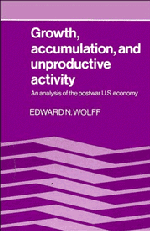Book contents
- Frontmatter
- Contents
- Preface
- 1 Introduction
- 2 Unproductive activity in a capitalist society
- 3 A Marxian accounting framework
- 4 A growth model of accumulation and unproductive labor
- 5 Rise of unproductive activity in postwar economy
- 6 Absorption of labor and capital and rate of surplus value
- 7 Absorption of new resources and growth in real income
- 8 Conclusions and speculations
- Appendix: Data sources and methods
- References
- Index
3 - A Marxian accounting framework
Published online by Cambridge University Press: 24 March 2010
- Frontmatter
- Contents
- Preface
- 1 Introduction
- 2 Unproductive activity in a capitalist society
- 3 A Marxian accounting framework
- 4 A growth model of accumulation and unproductive labor
- 5 Rise of unproductive activity in postwar economy
- 6 Absorption of labor and capital and rate of surplus value
- 7 Absorption of new resources and growth in real income
- 8 Conclusions and speculations
- Appendix: Data sources and methods
- References
- Index
Summary
The catch in this argument, of course, is the quiet assumption that rules and regulations are all freely chosen through something akin to a market process. In fact, that is far from being the case. All lawsuits are heavily subsidized by the government and are usually desired by only one party to the dispute. Many rules are the work of judges or bureaucrats over whom the general public has little control. Although the public may support the general outlines of a statute, its details and complexities are rarely understood, let alone endorsed, by the average voter. Most of our laws and administrative regulations have been complicated by the efforts of pressure groups and lobbyists. Even legislation widely approved when enacted often proves unexpectedly cumbersome and ineffective, yet efforts at reform quickly die from inertia or from the opposition of vested interests. …
In labor law, more than half the work of the National Labor Relations Board is devoted to defining the proper employee unit in which to hold elections and enforcing an intricate body of rules governing the electioneering behavior of unions and employers. Unit determinations often consist of fine-spun applications of vague, even contradictory, principles with no convincing demonstration of how the public interest is served. One can argue that these decisions cause little harm, especially if the size of the election unit is unimportant. But they do cost inordinate amounts of money, time, and energy. […]
- Type
- Chapter
- Information
- Growth, Accumulation, and Unproductive ActivityAn Analysis of the Postwar US Economy, pp. 56 - 85Publisher: Cambridge University PressPrint publication year: 1986



